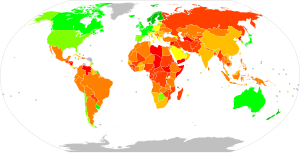
Back Акоррупциа Abkhazian Korrupsie Afrikaans Korruption ALS فساد Arabic فساد سياسى ARZ Korrupsiya Azerbaijani فساد AZB Карупцыя Byelorussian Карупцыя BE-X-OLD Корупция Bulgarian

Corruption is a form of dishonesty or a criminal offense which is undertaken by a person or an organization which is entrusted in a position of authority, in order to acquire illicit benefits or abuse power for one's personal gain. Corruption may involve many activities which include bribery, influence peddling and embezzlement and it may also involve practices which are legal in many countries.[1] Political corruption occurs when an office-holder or other governmental employee acts with an official capacity for personal gain.
Corruption is perceived as most common in kleptocracies, oligarchies, narco-states, and mafia states[citation needed], however, more recent research and policy statements acknowledge that it also exists in wealthy capitalist economies. In How Corrupt is Britain, David Whyte reveals that corruption exists "across a wide range of venerated institutions" in the UK,[2] which is ranked one of the least corrupt countries by the Corruption Perceptions Index (CPI). In a 2022 speech on "Modern Corruption," USAID Administrator Samantha Power stated: "corruption is no longer just about individual autocrats pilfering their nation’s wealth to live large,"[3] but also involves sophisticated transnational networks, including financial institutions hidden in secrecy. Responding to Whyte's book, George Monbiot criticized the CPI for its narrow definition of corruption that surveys mostly only Western executives about bribery.[4] Similarly, others point out that "global metrics systematically under-measure 'corruption of the rich' - which tends to be legalized, institutionalized, and ambiguously unethical - as opposed to 'corruption of the poor'".[5]
Corruption and crime are endemic sociological occurrences which appear with regular frequency in virtually all countries on a global scale in varying degrees and proportions. Recent data suggests corruption is on the rise.[6] Each individual nation allocates domestic resources for the control and regulation of corruption and the deterrence of crime. Strategies which are undertaken in order to counter corruption are often summarized under the umbrella term anti-corruption.[7] Additionally, global initiatives like the United Nations Sustainable Development Goal 16 also have a targeted goal which is supposed to substantially reduce corruption in all of its forms.[8] Recent initiatives like the Tax Justice Network goes beyond bribery and theft and brings attention to tax abuses.[9]
- ^ "Report" (PDF). siteresources.worldbank.org. Archived from the original (PDF) on 5 May 2015. Retrieved 25 September 2012.
- ^ Whyte, David (2015). How Corrupt is Britain?. Pluto Press. ISBN 978-0-7453-3529-2.
- ^ "Administrator Samantha Power Delivers Remarks, "The Face of Modern Corruption," at the International Anti-Corruption Conference Plenary Session | December 6, 2022". U.S. Agency for International Development. 14 December 2022. Retrieved 26 May 2024.
- ^ Monbiot, George (18 March 2015). "Let's not fool ourselves. We may not bribe, but corruption is rife in Britain". The Guardian. ISSN 0261-3077. Retrieved 26 May 2024.
- ^ Ang, Yuen Yuen (10 May 2024). "How Exceptional Is China's Crony-Capitalist Boom? | by Yuen Yuen Ang". Project Syndicate. Retrieved 26 May 2024.
- ^ "Insights | WJP Rule of Law Index 2022". worldjusticeproject.org. Archived from the original on 8 February 2023. Retrieved 8 February 2023.
- ^ Lehtinen, Jere; Locatelli, Giorgio; Sainati, Tristano; Artto, Karlos; Evans, Barbara (1 May 2022). "The grand challenge: Effective anti-corruption measures in projects". International Journal of Project Management. 40 (4): 347–361. doi:10.1016/j.ijproman.2022.04.003. ISSN 0263-7863. S2CID 248470690.
- ^ Doss, Eric. "Sustainable Development Goal 16". United Nations and the Rule of Law. Archived from the original on 20 December 2021. Retrieved 25 September 2020.
- ^ "Financial Secrecy Index – Tax Justice Network". Retrieved 26 May 2024.
© MMXXIII Rich X Search. We shall prevail. All rights reserved. Rich X Search